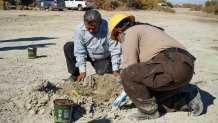
The California Natural Resources Agency (CNRA) established a Tribal Nature-Based Solutions Program as part of the agency’s commitment to fighting climate change and fostering partnerships with California Native American tribes.
The $101 million grant program is the first of its kind and was established on July 31 with the support of Gov. Gavin Newsom, according to a press release.
Tribal nature-based solutions are “projects that work with and enhance nature to address societal challenges,” including equity, the climate crisis and biodiversity, CNRA Deputy Secretary for Tribal Affairs Geneva E. B. Thompson said.
She gave an example solution that traditional agricultural practices allow for healthy soil that retains more carbon. By providing tribes funding to promote cultural practices of cultivation, tribal members will benefit from traditional foods while creating healthier soil, plants and animals, Thompson said.
Get top local stories in Southern California delivered to you every morning. >Sign up for NBC LA's News Headlines newsletter.
“Supporting tribes in doing what they do best benefits all Californians because we know tribes are bringing that deep place-based knowledge to restoring the lands,” Thompson said.
Other potential project ideas can be found in the state’s Natural and Working Lands Climate Smart Strategy and Pathways to 30x30 Strategy.
The CNRA spoke with more than 70 different tribes about the development of those two programs, Thompson said.
“I'm really proud of the fact that we were able to integrate so many tribal priorities throughout those two strategies,” she said, adding that those conversations set “a great framework for how the state thinks about partnering with tribes in implementation of nature-based solutions.”

Native Americans and California
Local
Get Los Angeles's latest local news on crime, entertainment, weather, schools, COVID, cost of living and more. Here's your go-to source for today's LA news.
California is home to more people of Native American heritage than any other US state, and there are currently 109 federally recognized tribes in the state.
“Due to a lot of international, federal, and state policies, we have a long history of historical wrongs committed against California Native Americans,” Thompson said.
In the late 19th century, the federal government removed Native American children from their families and forced them to attend boarding schools that were government-funded and often ran by churches to make them assimilate to American culture.
More than one-half of California residents and their descendants who identify as Native American were forced to relocate their homes to large urban areas as part of the federal government’s termination policy. In 1953, Congress began disbanding tribes and selling their land.
Many of these historical efforts to erase the traditions and beliefs of Native Americans has been considered a cultural genocide, and the legacies of these policies “are still being felt today,” Thompson said.
Native Americans and Alaskan Natives have a life expectancy 5.5 years less than the rest of the country. They also face disproportionate rates of disease burden, poverty and poor educational outcomes.
How to apply for funding
Newsom announced the allocation of $100 million for the program at a California Truth and Health Council meeting in March 2022. The California Ocean Protection Council issued $1 million to a Tribal Small Grants Program.
$25 million of the funding will go to time-sensitive projects, and the deadline to apply for this funding is Aug. 28. For all other projects, preliminary applications are due Sept. 29 and full proposals are due Feb. 6, 2024.
The CNRA is currently accepting applications. People can apply by filling out a preliminary project proposal application form. Next, applicants will develop a project proposal, and if the proposal is accepted, the CNRA will conduct a field visit or applicants will present their project. Finally, applicants will submit documentation proving they will be able to carry out their projects.
The CNRA is currently creating a Tribal Nature-Based Solutions Technical Expert Panel to review applications for the program. The agency hosts virtual office hours every Friday to support people applying.
“It's not solving all the world's problems, but the hope is that it's identifying those truths, and then providing the resources, collaboration and partnership with tribes to work towards addressing the everyday realities that tribes and native communities are facing,” she said.



